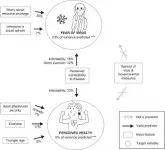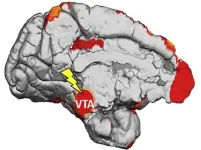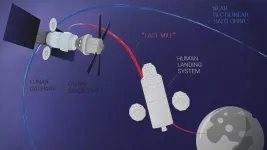Fear of COVID-19 :
Psychological, not environmental factors are important
2021-03-15
(Press-News.org) During pandemics, protective behaviors need to be motivated by effective communication. A critical factor in understanding a population's response to such a threat is the fear it elicits, since fear both contributes to motivating protective responses, but can also lead to panic-driven behaviors. Furthermore, lockdown measures affect well-being, making it important to identify protective factors that help to maintain high perceived levels of health during restrictions. An international team of researchers led by scientists from the University of Vienna has now identified psychological predictors of fear and health during the lockdowns. The result of the study, published in PLOS ONE: Individual psychological variables have a much better predictive power than environmental variables.
The current publication aims to identify predictors of fear and perceived health during stay-at-home orders in response to the COVID-19 pandemic. "This way we can predict how different people and populations will react to external threats and restrictions," explains Stephanie Eder from the Faculty of Psychology.
Researchers from the University of Vienna in collaboration with scientists from the University of Wroclaw (PL), University of Barcelona (ESP), Charles University and Jan Evangelista Purkyne University (CZ) have investigated 533 participants during the 'first wave' of the COVID-19 pandemic in Europe.
Utilizing machine-learning models, they identified psychological predictors of fear and health during the lockdowns. Fear can be predicted very well when worries about shortages in supply, perceived infectability to diseases in general, germ aversion, and infections in the immediate social sphere are taken into account. Predictors of perceived health include higher perceived infectability to diseases in general, attachment security, physical activity and younger age; suggesting that older populations with high perceived infectability and insecure attachment may be most vulnerable during these uncertain times.
Interestingly, environmental variables such as the local severity of lockdown restrictions and mortality had no predictive value for either of the target variables.
"We could show the value of 'micro-level', psychological factors over macro-scale environmental conditions when predicting a population's response to a crisis and when designing behavioral interventions for specific target groups.", says Eder.
INFORMATION:
Other aspects of this pandemic have been investigated as part of the same project and can be accessed over the Open Science Framework:
https://osf.io/db4px/
Publication in PlosOne:
Eder, S. J., Steyrl, D., Stefanczyk, M., M., Pieniak, M., Molina, J. M., Pešout, O., ... Nicholson, A. (2021). Predicting fear and perceived health during the COVID-19 pandemic using machine learning: A cross-national longitudinal study. PLOS ONE. DOI: 10.1371/journal.pone.0247997
[Attachments] See images for this press release:

ELSE PRESS RELEASES FROM THIS DATE:
2021-03-15
We all have a clear picture in mind when we think of metals: We think of solid, unbreakable objects that conduct electricity and exhibit a typical metallic sheen. The behaviour of classical metals, for example their electrical conductivity, can be explained with well-known, well-tested physical theories.
But there are also more exotic metallic compounds that pose riddles: Some alloys are hard and brittle, special metal oxides can be transparent. There are even materials right at the border between metal and insulator: tiny changes in chemical composition turn the metal into an insulator - or vice versa. ...
2021-03-15
Cryoprotectants are used to protect biological material during frozen storage
They have to be removed when defrosting, and how much to use and how exactly they inhibit ice recrystallisation is poorly understood
The polymer poly(vinyl)alcohol (PVA) is arguably the most potent ice recrystallisation inhibitor and researchers from the University of Warwick have unravelled how exactly it works.
This newly acquired knowledge base provides novel guidelines to design the next generation of cryoprotectants
When biological material (cells, blood, tissues) is frozen, cryoprotectants are used to prevent the damage associated with the formation of ...
2021-03-15
Researchers uncovered for the first time what happens in animals' brains when they learn from subconscious, visual stimuli. In time, this knowledge can lead to new treatments for a number of conditions. The study, a collaboration between KU Leuven, Massachusetts General Hospital, and Harvard was published in Neuron.
An experienced birdwatcher recognises many more details in a bird's plumage than the ordinary person. Thanks to extensive training, he or she can identify specific features in the plumage. This learning process is not only dependent on conscious processes. Previous research has shown that when people are rewarded during the presentation of visual stimuli that are not consciously perceivable, ...
2021-03-15
Researchers from Skoltech and the Massachusetts Institute of Technology have analyzed several dozen options to pick the best one in terms of performance and costs for the 'last mile' of a future mission to the Moon - actually delivering astronauts to the lunar surface and back up to the safety of the orbiting lunar station. The paper was published in the journal Acta Astronautica.
Ever since December 1972, when the crew of Apollo 17 left the lunar surface, humans have been eager to return to the Moon. In 2017, the US government launched the Artemis program, which intends ...
2021-03-15
An RCSI study conducted in Beaumont Hospital in Dublin has found that surgery, rather than antibiotics-only, should remain as the mainstay of treatment for acute uncomplicated appendicitis.
Published in the Annals of Surgery and led by researchers from the RCSI University of Medicine and Health Sciences, the study entitled the COMMA trial (Conservative versus Open Management of Acute uncomplicated Appendicitis) examined the efficacy and quality of life associated with antibiotic-only treatment of acute uncomplicated appendicitis versus surgical intervention. The results revealed that antibiotic-only treatment resulted in high recurrence rates and an inferior quality ...
2021-03-15
Drugs such as beta-adrenergic antagonists (beta blockers) have been linked to a range of adverse effects, including depression. But how reliable are these data, and which psychiatric side effects might indeed be caused by these drugs? These questions have been addressed by a team of researchers from Charité - Universitätsmedizin Berlin, whose comprehensive meta-analysis has been published in Hypertension*. While treatment with beta blockers was not found to be associated with an increased incidence of depression, some studies recorded higher levels of sleep disturbance.
Beta-adrenergic ...
2021-03-15
During the past decade the European People's Party in the European Parliament was criticized for its unwillingness to vote for measures that would sanction the Hungarian Fidesz government, which is accused of breaching key democratic principles.
Researchers have said the EPP protected Fidesz in order to safeguard Hungarian votes in its ranks and protect their own interests, but this support had weakened by 2019, when Fidesz was suspended from the EPP.
Researchers analysed the votes of EPP MEPs for 24 resolutions covering the protection of EU fundamental values ...
2021-03-15
(Boston)-- Warning signs for Alzheimer's disease (AD) can begin in the brain years before the first symptoms appear. Spotting these clues may allow for lifestyle changes that could possibly delay the disease's destruction of the brain.
"Improving the diagnostic accuracy of Alzheimer's disease is an important clinical goal. If we are able to increase the diagnostic accuracy of the models in ways that can leverage existing data such as MRI scans, then that can be hugely beneficial," explained corresponding author Vijaya B. Kolachalama, PhD, assistant professor of medicine at Boston University School ...
2021-03-15
COLUMBUS, Ohio - An analysis of historic and projected simulations from 19 global climate models shows that, because of climate change, the temperature in the Antarctic peninsula will increase by 0.5 to 1.5 degrees Celsius by 2044.
The projections also showed that precipitation - a threat to ice if it manifests as rain - will likely increase on the peninsula by about 5% to 10% over that same time period.
The estimates were published recently in the journal Climate Dynamics.
"We are concerned about these findings. We've been seeing overall quite big changes on the peninsula, generally getting warmer and ice shelves and glaciers discharging into the ocean," said David Bromwich, a leading author of the study and a research professor at The Ohio State University ...
2021-03-15
PROVIDENCE, R.I. [Brown University] -- Proposals to create a national gun registry have long been met with fierce opposition from gun rights advocates. While proponents say a registry would help in tracking guns used in crimes, opponents worry that it would compromise privacy and could be used by the federal government to confiscate firearms. Now, a team of Brown University computer scientists has devised a way of implementing a registry that may allay some of those concerns.
They propose a database that uses advanced encryption to protect privacy. The encryption scheme allows the database to be searched without being decrypted, which means people querying the database see only the records they're looking for and nothing else. Meanwhile, the system places control of data ...
LAST 30 PRESS RELEASES:
[Press-News.org] Fear of COVID-19 :
Psychological, not environmental factors are important






